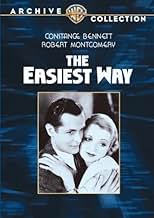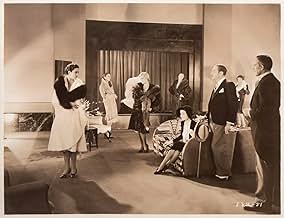Füge eine Handlung in deiner Sprache hinzuLaura from a poor family rejects her boyfriend for a wealthy older man. She falls for a younger journalist, leaves the wealthy man but struggles financially.Laura from a poor family rejects her boyfriend for a wealthy older man. She falls for a younger journalist, leaves the wealthy man but struggles financially.Laura from a poor family rejects her boyfriend for a wealthy older man. She falls for a younger journalist, leaves the wealthy man but struggles financially.
- Regie
- Drehbuch
- Hauptbesetzung
- Auszeichnungen
- 1 wins total
- Hotel Clerk
- (Nicht genannt)
- Brockton Associate
- (Nicht genannt)
- Women at Cook-Out
- (Nicht genannt)
- Andy Murdock
- (Nicht genannt)
- Chris Swoboda - Laura's Suitor
- (Nicht genannt)
- Bud Williams
- (Nicht genannt)
- Mrs. Clara Williams
- (Nicht genannt)
- Mr. Gensler
- (Nicht genannt)
- Tillie Murdock
- (Nicht genannt)
- Alfred - Brockton's Butler
- (Nicht genannt)
Empfohlene Bewertungen
Laura (Constance Bennett) lives in a crowded apartment with her trashy family. They're poor and the father is a genial drunk. Because of this background, it's not at all surprising that when she is given a chance to become her boss' mistress, she jumps at the chance. After all, he's loaded and pampers her like she's never been pampered before! But folks who know her realize what sort of a woman she is, particularly her brother-in-law, Nick. He's wise to the trampy sort of life she leads.
A bit later, when Laura is on vacation out west, she meets a nice- guy reporter, Johnny (Robert Montgomery). He's handsome, sweet and you assume they'll soon marry---and he knows what sort of woman she was. However, this is only about half-way through the film, so you know IF there's going to be a happily ever after, it will have to come after a few plot twists!
This film is a great example of the so-called 'Pre-Code' and its sensibilities. Although most folks today think all the movies made back in the good 'ol days were very prudish, this was NOT the case before mid-1934. In the early 30s, studios made all sorts of very adult films with plots involving prostitutes, abortion, fornication and even, occasionally, nudity and cursing. While the films sometimes didn't always SAY that is what was going on, it was always heavily implied and the adults in the audience know the score. Here in "The Easiest Way", words like 'mistress', 'prostitute' or even that she's sleeping with the suave boss (Adolph Menjou)...but it's clearly happening! On top of that, he no-good dad doesn't mind...he LIKES the money she can send home! Welcome to the pre-code era, folks!
So the important question about all this is whether or not the film is any good. If you're watching it for Gable like I was, don't expect too much from him. His role is very limited and he clearly is just a contract actor in this film. As for the film itself, its quite good. The only negative, and I actually liked this, was that the ending is very vague--so if you're looking for a perfect, formulaic sort of picture, this ain't it!
This little film is strictly soap opera, but it's well presented and makes a pleasant diversion. The production values are good, especially in the opening sequence which reveals the inside of a tenement flat, and causes the viewer to appreciate the trouble MGM expended on even its small pictures.
Beautiful Constance Bennett is very convincing as a woman who frankly admits her moral standing -- until true love complicates everything. Urbane Adolphe Menjou, as the rich businessman who controls Bennett, is slightly more sympathetic than usual in a role he could probably have played in his sleep. And Robert Montgomery gives his patented friendly portrayal as the steadfast fellow who earnestly loves Bennett -- until he is told the truth of her situation.
A fine supporting cast helps the proceedings: tough-talking Marjorie Rambeau as an aging model out to squeeze every penny possible from the male animal; lazy J. Farrell MacDonald & careworn Clara Blandick as Bennett's poor parents; blonde Anita Page as Bennett's lively younger sister; and sturdy Clark Gable, as Page's laundryman boyfriend, who would eventually supplant Montgomery as MGM's favorite heartthrob.
Movie mavens will recognize jovial Dell Henderson and stately Hedda Hopper, both uncredited as Bennett's Colorado hosts.
Then she meets newspaperman Robert Montgomery and wants to give it all up for true love. I won't reveal the ending. But it's not an especially happy one, and three cheers to Hollywood for not selling out.
A few comments on the perfumers: . Robert Montgomery is not someone I can imagine anyone's throwing over even a modest income for.
. Clark Gable has a fairly small role here. He plays, with of course no mustache, Bennett's proper working class and disapproving brother-in-law.
. Bennett is chic as she always is. But she isn't photographed in a faltering manner. Her profile is rather flat. She appears to have an overbite and her false eyelashes seem apparent. Maybe the director of photography and she did not get on well.
. The brilliant Marjorie Rameau turns in the earliest of her fine performances that I have seen. She plays another kept woman. When Bennett is down on her luck and asks for a loan, she sends her packing. But when her daddy dies, she comes to Bennett for money and is given it.
Her performance is in a different realm from that of any of the other players in this movie.
Bennett is a strangely forgotten star of early movies. Rambeau is a sadly underrated actress, whose career spanned several decades.
Wusstest du schon
- WissenswertesLaura's overdue hotel bill of $62.50 would equate to over $1,200 in 2022.
- PatzerWhile on a trail ride in Colorado, Jack invites Laura to take in his pet view. The view is of Yosemite in California.
- Zitate
Jack Madison: You know, I may be gone two, maybe three months. What are you going to do? Are you going to be all right?
Laura Murdock: Mmm-hmm. I'll go back to my old job, commercial posing.
Jack Madison: Not one of these artists that, eh...
Laura Murdock: No. Nothing worse than undies, darling.
- Alternative VersionenThe scene where Elfie enters Laura's father's house, (47 minutes), Elfie is played by Marjorie Rambeau and she is wearing a chinchilla trimmed coat. I have two film still photographs showing Marie Prevost as Elfie wearing a fox trimmed coat and a different hat. Laura is wearing exactly the same outfit and the set on which it was filmed is exactly the same.
- VerbindungenAlternate-language version of Quand on est belle (1932)
- SoundtracksThe Sidewalks of New York
(1894) (uncredited)
Music by Charles Lawlor
Played as background music in the opening scene
Top-Auswahl
Details
Box Office
- Budget
- 310.000 $ (geschätzt)
- Laufzeit1 Stunde 13 Minuten
- Farbe
Zu dieser Seite beitragen





































